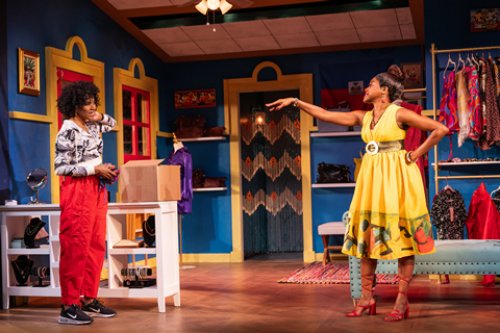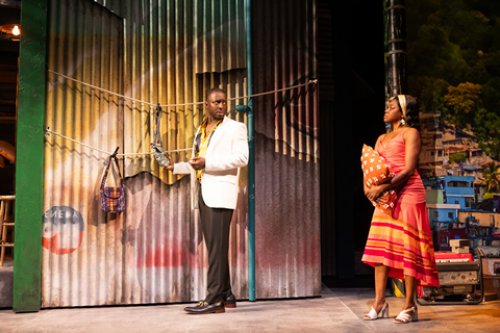Bad Kreyòl
Morriseau’s tender play portrays cousins, one visiting Haitian-American and the other Haitian-born, as they tackle cultural identity and the notion of family.

Kelly McCreary and Pascale Armand in a scene from Dominique Morisseau’s “Bad Kreyòl” at the Pershing Square Signature Theatre Center (Photo credit: Matthew Murphy)
In Dominique Morisseau’s Bad Kreyòl we are witness to many layers of two cousins’ relationship that, were it not for a promise they made to their grandmother, we would not get to see played out in the same room. Simone has led the better life in the United States whereas her cousin Gigi has had all to do to outrun earthquakes and hurricanes in her native Haiti, yet this is never for one minute painted as a tale of the Princess and the Pauper.
Simone arrives in Haiti to fulfill her beloved grandmother’s wish to see the two women connect again but within minutes of arrival, Gigi makes judgments about Simone’s hair as well as Simone’s perceptions of Haitian life. Gigi has continued to run the family boutique with the assistance of Pita, their family’s longtime “family member,” or rather, housekeeper. Pita’s family was not a fortunate one and opted to sell him to Gigi’s in exchange for room and board through a common Haitian practice known as “restavèk.” Where Simone looks at it as a form of slavery and a violation of international labor laws, Gigi sees it as akin to American foster care. This initial butting of heads is in the very first minutes of the visit.

Kelly McCreary and Jude Tibeau in a scene from Dominique Morisseau’s “Bad Kreyòl” at the Pershing Square Signature Theatre Center (Photo credit: Matthew Murphy)
Simone’s well-meaning intentions, never without her whole heart in the decision-making process, are often misguided. On learning that Lovelie, a former sex worker now a seamstress, still has to fight off advances from a member of a product buyer’s team, someone whose donations keep Lovelie’s business afloat, Simone’s first impulse is to publicly blow the whistle on the donor’s inappropriate behavior. Lovelie is reluctant to take part in any whistleblowing as she sees the bigger picture of repercussions to her business.
Another situation involving Pita also is a delicate decision not handled in the best way. Simone encourages him to attend an underground LGBT meeting, not considering that there are reasons why it’s an underground meeting. A country that is 80% old world Roman Catholic laced with Voodoo does not look kindly on same-sex assemblies nor relationships. Though Gigi’s reactions border on overreacting histrionics, her worries about Pita’s safety are well-founded. He is in fact attacked “by a drunk” after the meeting and returns home beaten and bloodied.
Morriseau in her usual fashion gives us characters we can embrace. We see both sides of the cousins’ arguments. Every point on either side is valid. They have lived their lives in two very different cultural settings and would naturally have different takes on a given situation, yet each brings a pragmatic sensibility to their solutions.

Fedna Jacquet, Kelly McCreary and Jude Tibeau in a scene from Dominique Morisseau’s “Bad Kreyòl” at the Pershing Square Signature Theatre Center (Photo credit: Matthew Murphy)
Kelly McCreary as Simone remains centered as she is torn between a love for her family’s country and the feeling of being a stranger in a strange land. When she realizes she may be leaving the island for home not having sacrificed anything in her arguments, she finds breathing space in accepting her cousin’s love language: food. She won’t be going home without learning how to make those chicken “pates.” It is a testament to her learning that when no one bends, no one is a winner. McCreary finds the honesty in Simone’s solitary vlogging: “Like I’m missing a clue or read the signs wrong or…like I’m out of my league here. Like I don’t belong where I thought I belonged. And I was trying. To help. To be useful. To not just be like every other tourist that comes to a place and takes from the people and leaves nothing behind. I didn’t want to be that. I didn’t wanna feel like some colonizer in another culture.”
Pascale Armand is the “poto mitan,” or central pillar, as Gigi the nurturer. Armand plays the acerbic cousin to the hilt, but with that nurturing comes necessary doses of tough love…”Listen, don’t go trying to drudge up ghosts of earthquakes and hurricanes past. We do not dwell here. We move on.” Realizing her ability to give Pita his marching orders is being tested by advice he gets from Simone, “They will kill him without mercy or grace. They do not care if he dies in dignity. An earthquake would be gentler. If you believe yourself to be good. If you love Pita like I do. You will tell him you are wrong. You will save his life. Or you will be his death sentence.” In her confrontation with Thomas the exploitative buyer, she is chilling, “Outrage! Why is there not outrage?” Chances are slim that he has ever been spoken to in that manner by a woman. Armand poignantly uncovers the vulnerability of her character in her desperate heart-to-heart with Simone, “I don’t have affinity space…I don’t have places like you. To go. And meet people. And find family in any land. You are this. I am not.”

Kelly McCreary in a scene from Dominique Morisseau’s “Bad Kreyòl” at the Pershing Square Signature Theatre Center (Photo credit: Matthew Murphy)
Jude Tibeau as Pita is the utter joy and voice of reason of this production. Playing the delightful bon viveur, Tibeau’s moments of quiet reflection are laced with the candor of someone whose life has been one on the periphery having to hide his sexuality. “What work does it take to love someone? Love is easy, cherie…Love is not work. Love is lazy. Love is not thinking too much. Love is being still and letting nature do the rest…Love does not have to make your bones weary. Love is the vitamin. Love does not drain the soil. Love replenishes it. It is very easy to love.” It is a pity that Pita lives in a culture that doesn’t allow him to love as easily as he describes.
Fedna Jacquet imbues Lovelie with the inner strength necessary for someone with a past to overcome obstacles it is too late to do anything about. What hasn’t killed her has definitely made her stronger. Her knee-jerk reaction to Simone wanting to help her in handling the donor who harasses her speaks volumes of a woman who has already thought this out. Andy Lucien as Thomas reveals a conscience that has already rationalized away any thoughts of altruism when considering helping the individuals he so gainfully exploits.
Director Tiffany Nichole Greene moves the intertwining stories at a gentle pace giving us revelatory and contemplative alone moments. Pacing is unhurried (as we are in Haiti) making us giddily curious to see what transpires in the moments after the play concludes. Jason Sherwood’s scenic elements are bright, illuminating a vibrant side to Haiti that makes us forget the destruction Americans normally associate with the besieged country. The stage curtain is reminiscent more of Italy’s colorful Cinque Terre than how we have imagined Haiti in the past. The festively decorated boutique turns revealing the back of the house as well as Lovelie’s studio. Her studio relies on the fabrics she works with to supply the color in those scenes.

Andy Lucien and Pascale Armand in a scene from Dominique Morisseau’s “Bad Kreyòl” at the Pershing Square Signature Theatre Center (Photo credit: Matthew Murphy)
Haydee Zelideth’s imaginative costume design adorns Gigi in island versions of haute couture while appropriately dressing Simone and Lovelie less flashy. Zelideth puts Thomas in GQ attire while Pita is dressed to show off a muscled body he works hard to keep up. Alan C. Edward’s lighting design is sensitive to the splashes of color in the scenic elements as well as keen to pull back on night scenes and Lovelie’s dimmer studio. The sound design of Curtis Craig and Jimmy Keys never lets us forget we are in a now upbeat (and danceable) Haiti.
Bad Kreyòl is gifted with a pre-show voiceover from the playwright herself: “To love a people is to learn their language.” This speaks volumes for two women who know what they know, aren’t keen on changing it up any, and are inherently both generous givers and caretakers in every aspect of their lives. And yes, sometimes you need to butt heads.
Bad Kreyòl (through December 1, 2024)
Signature Theatre Company and Manhattan Theatre Club
Pershing Square Signature Center, 480 West 42nd Street, in Manhattan
For tickets: visit http://www.signaturetheatre.org
Running time: two hours and ten minutes including one intermission






Leave a comment